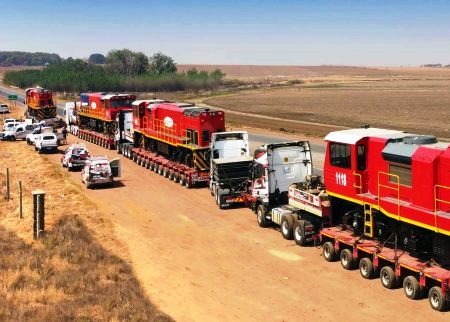Grindrod’s R8 Billion Vision: Powering Trade and Transformation Across South Africa and Mozambique
Grindrod, a leading maritime cargo handler, is launching an R8 billion expansion to strengthen its operations in South Africa and Mozambique. With a 50:50 investment split, the company aims to enhance trade links through the Maputo Port, acquire full ownership of the Matola Terminal, and capitalize on South Africa’s newly opened rail sector. Despite political and logistical challenges, CEO Xolani Mbambo is betting on bulk cargo, logistics, containers, and rail to position Grindrod as a powerhouse in Southern Africa’s trade ecosystem.
LOGISTICS
Teresa Ndlovu
3/9/20254 min read


Grindrod Sets Sights on Ambitious Expansion in South Africa and Mozambique
Maritime cargo handling giant Grindrod is gearing up to launch an R8 billion investment program aimed at supercharging its operations across South Africa and Mozambique, signaling a bold push to solidify its footprint in Southern Africa’s logistics and trade ecosystem.
Speaking at the announcement of Grindrod’s financial results for the year ending December 31, 2024, CEO Xolani Mbambo revealed that the capital allocation would be evenly divided—R4 billion each—between South Africa and Mozambique. This 50:50 split underscores Grindrod’s strategic intent to foster a balanced trade corridor between the two nations, leveraging its long-standing presence in the region to drive economic connectivity. “Our focus is on facilitating seamless trade flows and unlocking value for both markets,” Mbambo noted, highlighting the company’s dual-country growth vision.
A Legacy of Resilience in Mozambique
Grindrod’s history in Mozambique dates back to 2005, when it began operations at the Maputo Port, a critical gateway for regional trade. Over the past two decades, the company has weathered multiple administrative shifts and political upheavals in the country. However, the past year brought significant challenges. Political instability in Mozambique, including intermittent border closures with South Africa, dealt a hefty blow to Grindrod’s bottom line. The company reported a loss of 4.4 million tonnes of goods in transit and a R200 million hit to headline earnings for the 2024 financial year. These disruptions, tied to unrest and logistical bottlenecks, exposed the fragility of cross-border trade routes—a challenge Grindrod now aims to address head-on with its investment strategy.
Mbambo emphasized that despite these setbacks, Grindrod remains committed to Mozambique, where the Maputo Port serves as a vital artery for commodities like coal, chrome, and fertilizers. The port’s proximity to South Africa’s industrial heartland makes it a linchpin for regional exports, and Grindrod’s planned upgrades signal confidence in its long-term potential.
Refinery Strategy: A Multi-Pronged Approach
At the heart of Grindrod’s expansion lies a refined operational strategy targeting four key pillars: bulk cargo, logistics, containers, and rail. This multi-faceted approach is designed to diversify revenue streams while capitalizing on emerging opportunities in Southern Africa’s infrastructure landscape.
A significant chunk of the capital—R4.4 billion—will go toward acquiring the remaining 35% stake in the Matola Terminal, a coal-handling facility at the Maputo Port. Full ownership of Matola is expected to bolster Grindrod’s control over bulk commodity exports, particularly coal, which remains a cornerstone of the region’s economy. Analysts suggest this move could position Grindrod to capture a larger share of the global coal market, especially as demand from Asia persists despite the global shift toward greener energy.
Rail Ambitions Take Center Stage
On the rail front, Grindrod is allocating R1.2 billion to seize “next opportunities” in South Africa’s evolving rail sector. The South African government’s recent decision to open its long-monopolized rail network to private operators has created a rare window for companies like Grindrod to step in. Mbambo revealed that the group is already a seasoned player in this space, operating a fleet of 41 locomotives and 85 wagons. To prepare for new private-sector concessions, Grindrod is refurbishing 13 locomotives, a move that will enhance its capacity to haul freight across the country’s sprawling rail network.
South Africa’s rail system, once a backbone of its economy, has deteriorated in recent years due to underinvestment and mismanagement by state-owned Transnet. Private participation is seen as a game-changer, and Grindrod’s early mover advantage could give it an edge over competitors. “We’re not just participating—we’re shaping the future of rail logistics in South Africa,” Mbambo said, hinting at potential partnerships or contracts in the pipeline.
Broader Context: Regional and Global Implications
Grindrod’s R8 billion bet comes at a pivotal moment for Southern Africa. South Africa, the continent’s most industrialized economy, relies heavily on efficient ports and rail to sustain its export-driven growth. Meanwhile, Mozambique’s strategic location and untapped resources make it an increasingly attractive hub for trade and investment. By bridging these two markets, Grindrod aims to tap into a combined economic potential that could ripple across the Southern African Development Community (SADC) region.
The company’s plans also align with broader global trends. As supply chains reconfigure post-pandemic and geopolitical tensions reshape trade routes, Africa’s ports and logistics networks are gaining prominence. Grindrod’s investments could position it as a key player in this shift, particularly if it can mitigate risks like political instability and infrastructure gaps.
Challenges Ahead
Still, the road to expansion is not without hurdles. In Mozambique, ongoing security concerns in the northern Cabo Delgado province—though distant from Maputo—could spook investors and disrupt regional stability. In South Africa, regulatory delays and competition from other private rail operators could complicate Grindrod’s ambitions. Mbambo acknowledged these risks but expressed confidence in the company’s ability to adapt, citing its two-decade track record in navigating turbulent waters.
With its R8 billion war chest, Grindrod is poised to transform itself from a regional operator into a powerhouse of Southern African trade and logistics. The success of this program will hinge on execution—streamlining operations at Matola, modernizing its rail fleet, and strengthening ties between South Africa and Mozambique. For now, Mbambo and his team are betting big on a future where Grindrod doesn’t just move cargo but moves markets.
Future
© 2025. All rights reserved.


